update 31.
sudan surprises
Cycling in Sudan
2 January 2009
Total kilometers cycled: 46,805
Specific country info on routes & roads/food & accommodation/the locals available here.
Africa,
once visited,
creeps insidiously into the travelers blood and draws them back into
its depths
with an uncanny fascination. William Hoffman
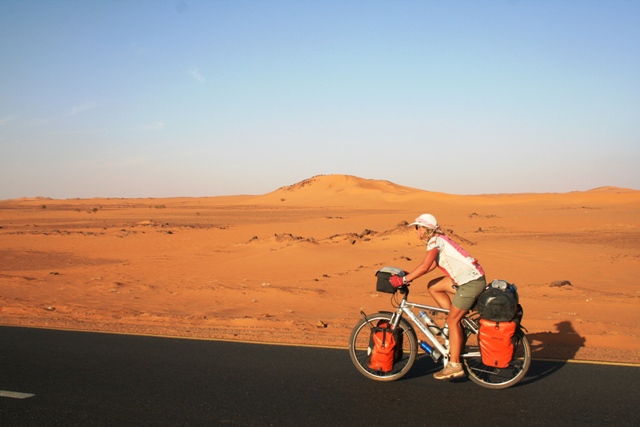 1,000 kilometers through the vast Nubian desert lay ahead. A
stretch of road that has taken on almost mythical proportions in
cycling
lore. There were those who claimed it was the toughest part of
their entire Africa tour. Bloggers wrote of pushing their bikes across
seas of deep sand. Taking shelter from the scorching sun
between
the axles of stopped lorries. Days of slogging it through the empty
desert without passing a single village. What awaited us?
1,000 kilometers through the vast Nubian desert lay ahead. A
stretch of road that has taken on almost mythical proportions in
cycling
lore. There were those who claimed it was the toughest part of
their entire Africa tour. Bloggers wrote of pushing their bikes across
seas of deep sand. Taking shelter from the scorching sun
between
the axles of stopped lorries. Days of slogging it through the empty
desert without passing a single village. What awaited us?The ride to Wadi Halfa got off to a less than auspicious start. We got lost on the way out of sprawling Khartoum and added an extra 20 kilometers to our journey. I become distracted, hit a rough patch of gravel and took a hard fall. My hitherto 'unbreakable' Nalgene water bottle sprung a leak. The wind blasted us with such force that a call to nature left my shoes splattered with urine.
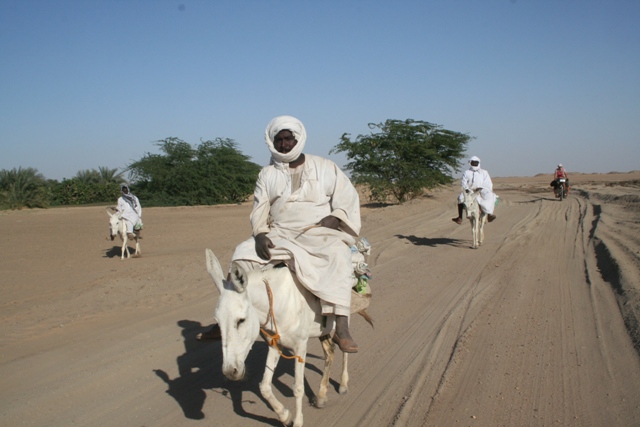 But if I've learned one thing over the past two years in Africa, it's
that things always look up. A passing motorist tosses you a
cold
coke when your throat is parched. A friendly family invites
you
in for the night just as darkness is falling. A group of
scrawny
kids bands together to push you up a steep pass. Never let
despair weasel its way into your thoughts.
But if I've learned one thing over the past two years in Africa, it's
that things always look up. A passing motorist tosses you a
cold
coke when your throat is parched. A friendly family invites
you
in for the night just as darkness is falling. A group of
scrawny
kids bands together to push you up a steep pass. Never let
despair weasel its way into your thoughts.And, as always, things did look up. The angry northern headwind refused to relent, but gradually our days in the
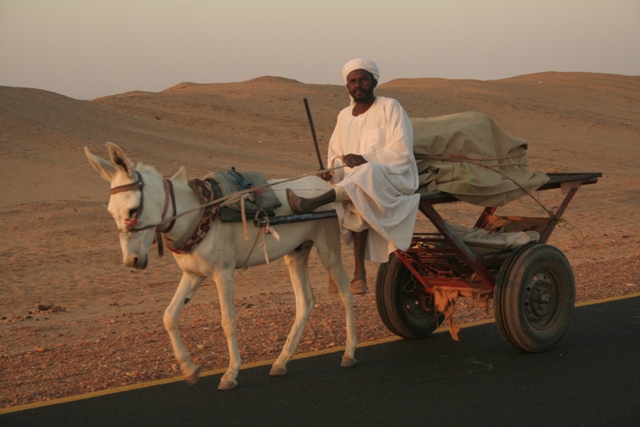 desert fell into their own comforting rhythm:
Waking early to grudgingly give up the warmth of the tent and
face the early morning chill. Zipping my jacket up tight
against
the blast of the frigid wind and pedaling like mad to make progress.
Taking in the glorious oranges and
reds of the desert sunrise and basking in the early morning rays.
Relishing the stretches of smooth tarmac and slogging
determinedly through the sandy and rocky portions of road.
Cursing the truck drivers who left me covered in a thick veil
of
dust. Breaking into a smile when the sandy track skirted
along
the lush banks of the Nile, passing through sleepy villages of mud
brick houses hidden behind high walls. Rejoicing
when a
settlement suddenly appeared on the
horizon and speeding up in anticipation of finding a little roadside
restaurant serving up a hearty dish of foul
and glasses of sweetly spiced tea. Sinking into a despondent
mood upon seeing that the village resembled a Montana ghost town
without a
single sign of commerce. Fretting about finding a safe spot
to
pitch the tent and then being looked after by the ever hospitable
Sudanese. Rationing our food supplies only to be astounded
again
and again at the generosity of the locals...
desert fell into their own comforting rhythm:
Waking early to grudgingly give up the warmth of the tent and
face the early morning chill. Zipping my jacket up tight
against
the blast of the frigid wind and pedaling like mad to make progress.
Taking in the glorious oranges and
reds of the desert sunrise and basking in the early morning rays.
Relishing the stretches of smooth tarmac and slogging
determinedly through the sandy and rocky portions of road.
Cursing the truck drivers who left me covered in a thick veil
of
dust. Breaking into a smile when the sandy track skirted
along
the lush banks of the Nile, passing through sleepy villages of mud
brick houses hidden behind high walls. Rejoicing
when a
settlement suddenly appeared on the
horizon and speeding up in anticipation of finding a little roadside
restaurant serving up a hearty dish of foul
and glasses of sweetly spiced tea. Sinking into a despondent
mood upon seeing that the village resembled a Montana ghost town
without a
single sign of commerce. Fretting about finding a safe spot
to
pitch the tent and then being looked after by the ever hospitable
Sudanese. Rationing our food supplies only to be astounded
again
and again at the generosity of the locals...
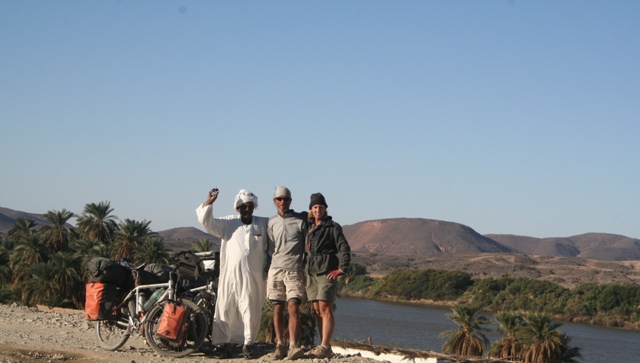

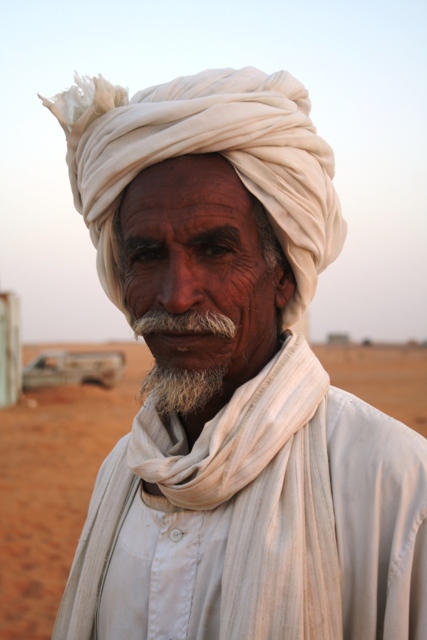 To get out of the country without paying a heavy fine (Mozambique, for
example, charges a hefty $100 per day for overstays) or being jailed
(as is the case for some hapless travelers in Cameroon) we were banking
on the kindness of the Sudanese and the fact that many have no clue how
to read English. The later we'd remarked at the
numerous police
roadblocks where passport details are jotted down in dusty ledgers
reminiscent of those found in West African nations. Invariably, the
officer charged with the task would thumb idly through the passport and
then ask me for my name, mother's name, nationality and
profession
which he would then transcribe in Arabic.
To get out of the country without paying a heavy fine (Mozambique, for
example, charges a hefty $100 per day for overstays) or being jailed
(as is the case for some hapless travelers in Cameroon) we were banking
on the kindness of the Sudanese and the fact that many have no clue how
to read English. The later we'd remarked at the
numerous police
roadblocks where passport details are jotted down in dusty ledgers
reminiscent of those found in West African nations. Invariably, the
officer charged with the task would thumb idly through the passport and
then ask me for my name, mother's name, nationality and
profession
which he would then transcribe in Arabic. Sure enough, after being shuttled from the police station to the immigration office and from this counter to that counter, filling out numerous forms that had to be scrutinized and rubber stamped by a small army of tea-drinking officials, we were awarded the coveted exit stamps from Sudan. No mention was made of our lengthy overstay.
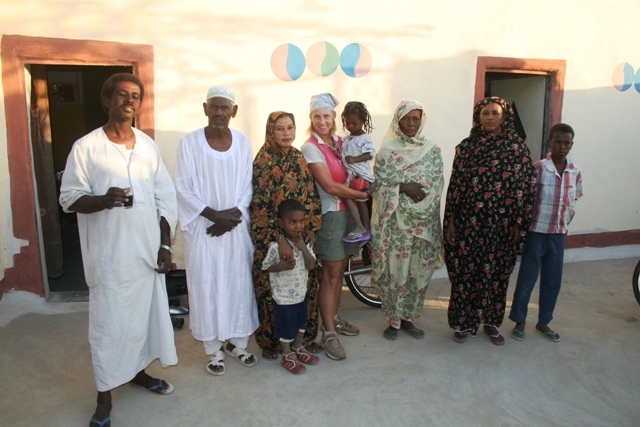
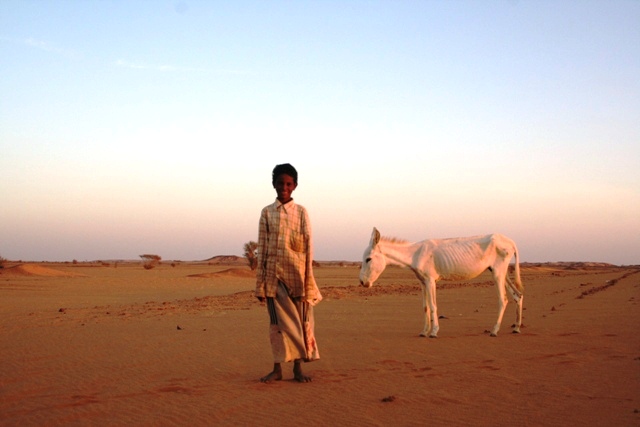
Egypt is something of a shock coming from Sudan. Aswan's main thoroughfare is crammed with touts and hustlers keen to empty the pockets of the hordes of aging European tourists, many of whom trail behind their multi-lingual guides clad in bermuda shorts and capri pants despite the chilly weather. McDonalds golden arches deface the Nile promenade and battalions of overly-eager touts offer ancient papyrus, felucca trips, pyramid t-shirts, camel rides, authentic Nubian swords and a wide array of kitschy souvenirs all for very cheap price--for you my friend I make big discount--no hassles- you look, no pay. And so on goes the pitch.
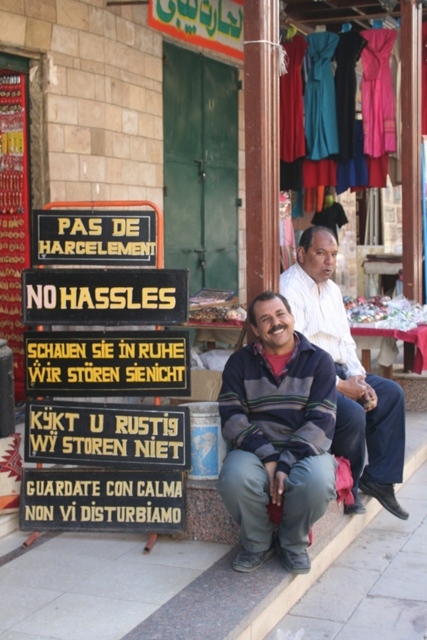 Just like the greenest of travelers,
we've fallen prey to the (often
unscrupulous) Egyptian way of doing business. Charged double
by
the suspiciously friendly man selling falafel sandwiches, who later
gave us two extra sandwiches when we confronted him with his 'simple
mistake'. The smiling bread man charged me 50
piastres for
bread instead of the usual 5 locals pay. And the
polite
young man selling cakes upped the price from two pounds to
three
when time came to pay.
Just like the greenest of travelers,
we've fallen prey to the (often
unscrupulous) Egyptian way of doing business. Charged double
by
the suspiciously friendly man selling falafel sandwiches, who later
gave us two extra sandwiches when we confronted him with his 'simple
mistake'. The smiling bread man charged me 50
piastres for
bread instead of the usual 5 locals pay. And the
polite
young man selling cakes upped the price from two pounds to
three
when time came to pay. In spite of all the hassles, we plan to play tourist for a few days before setting off into the desert again for the 1,600 km ride up to Cairo. There are temples and tombs to visit, exotic souqs to explore and lots of tasty looking food to feast on. Then it will be time for a gentle stroll by the Nile to watch the feluccas sailing between the palm-fringed islands. And then back to the room to revel in the luxury--hot running water, a small balcony, electricity that never fails, clean white sheets, a sit down toilet that flushes. I could get used to this life.
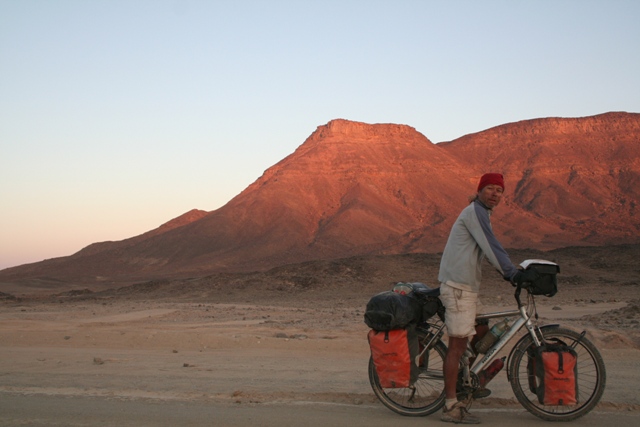
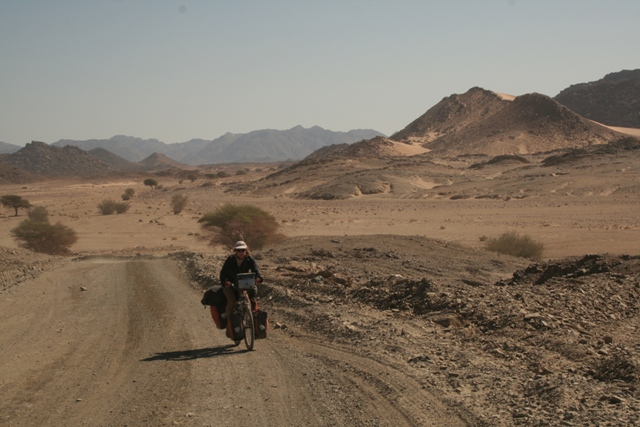
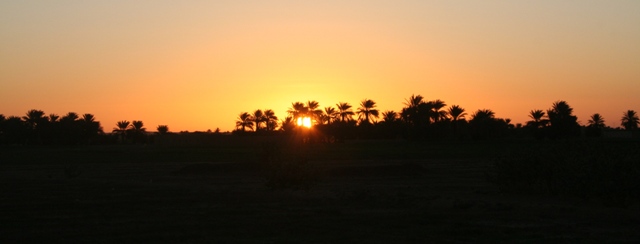

contact us at: worldbiking@gmail.com
Support our chosen charity and help educate girls in Africa-more info here

